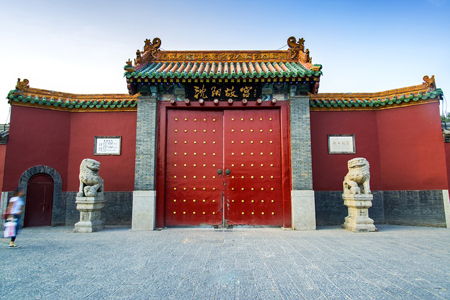Shenyang Imperial Palace
沈阳故宫
The Shenyang Imperial Palace, located at No.171,Shenyang Road, Shenhe District in Shenyang City,
沈阳故宫,位于沈阳市沈河区沈阳路171号,
is the only existing royal palace in China outside of the Forbidden City in Beijing.
是中国现有的除北京紫禁城外的唯一王宫。
The main structure of the palace was built in 1625 when Nurhachi was in power.
宫殿的主体结构是努尔哈赤首领掌权时建于1625年.
It was finished in 1636 by his son Abahai (Huangtaiji).Nurhachi and Abahai were both founding emperors of the Qing Dynasty.
由他的儿子皇极(Huangtaiji) 在1636年完成。努尔哈赤首领和皇太极都是清朝的开国皇帝。
Covering an area of more than 60 000 square meters (about 71 760 square yards),the Shenyang Imperial Palace is one fwelffh the size of the Forbidden City in Beijing.
沈阳故宫占地面积为60 .000多平方米(约71 760平方码),是北京紫禁城大小的二十分之一。

The palace consists of more than 300 rooms, formed around 20 courtyards.
宫殿由超过300间房间,大约20个庭院组成。
The palace can be divided into three sections-the eastern section, the middle section and the western section.
故宫可以分为三个部分:东部部分,中间部分和西方的部分。
Each section boasts of unique characteristics.
每个部分拥有的独特的特点。
The eastern section contains the very impressive Hall of Great Affairs (Da Zheng Dian).
东部部分包含的非常令人印象深刻的大厅大政殿。
Here emperors ascended the throne, enacted imperial edicts, and welcomed victorious generals and soldiers.
在这里皇帝登基,颁布诏令,欢迎获胜的将军和士兵。
The middle section starts from the Da Qing Gate, with Chong Zheng Dian (Jin Luan Dian), the Phoenix Tower and Qingning Palace arranged on a central axis from south to north.
中间部分从大清门开始,与崇政殿(金鸾殿),凤凰楼和清宁宫安排在从南往北的中心轴。
The western section was constructed by order of Emperor Qianlong (1711-1799). its main structure Is the Wen Su Pavilion.
西方部分是由乾隆皇帝(1711 - 1799)建造,其主要结构是文溯阁。
In front of this, there are the Opera Stage and Jiayin Hall and behind it is the Yang Xi Room.
在这面前,有戏台,嘉荫堂,它背后是仰熙斋。
The Shenyang Imperial Palace houses many ancient cultural relics,such as Nurhachi’s sword and Abahai’s broadsword.
沈阳故宫有许多古老的文物,如努尔哈赤首领的剑,皇太极的大刀。
There are also many artworks displayed here, such as paintings, calligraphy, pottery, sculptures and lacquer ware.
这里也有许多艺术品展示,如绘画、书法、陶瓷、雕塑和漆器。











